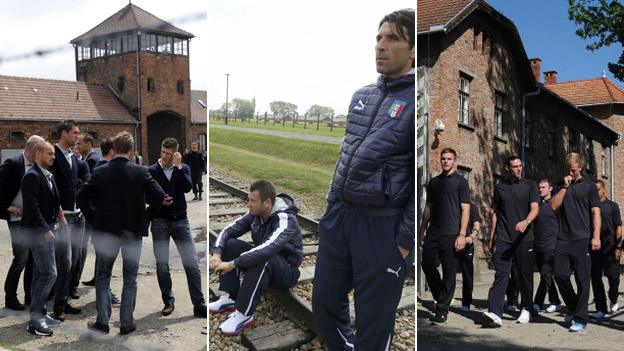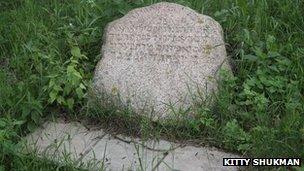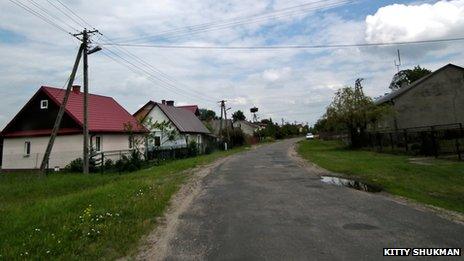A Polish village's forgotten Jewish dead
- Published

The Euro 2012 football championship is under way in Poland, where the Nazis murdered millions of people, mainly Jews, in World War II. Visits by players to the Auschwitz death camp show this dark history has not been forgotten. But how much is remembered in ordinary Polish towns and villages?
Off a highway south east of Warsaw a lane winds through a backwater of old farms and storks nesting on top of telephone poles. A sign then announces the village of Baranow.
At its centre stands a handful of ugly concrete supermarkets. The main road is battered. Dust covers the windows and pavements. It is poor here and the looks we get, though not hostile, are not friendly either.
Baranow is not in the guide books and most people would have no reason to come here. But I do.
Towards the end of the 19th Century, Baranow was home to my grandfather, David, after whom I am named. For centuries there had been a Jewish community in the village, and he had been part of it.
Like many he was a tailor, but conditions had been tough so he had moved away, eventually to England, though some of his relations stayed behind. We do not know how many - but at some point in World War II, possibly 1942, all the Jews of Baranow were rounded up and sent to their deaths.
My visit, with my daughter Kitty, is to see if there is any trace of the lives once led here.
Our starting point is a small hill above the village, the traditional site for a Jewish cemetery. A sign states in Polish that this was indeed the burial ground for the Jewish community.
An old man appears on a bike. At first he is suspicious.
"Are you here to claim back any land?"
I tell him I am not, I am just curious, and he relaxes.
He has kept the site clear of rubbish, he says. After the war, the headstones were all stolen and, in a final indignity, the place was used as a rubbish dump.
A single piece of stone lies in the grass. It is inscribed in Hebrew but very faded.

A single piece of stone inscribed in Hebrew survives
"I found it by the road, and brought it back here," the old man says.
Kitty wants to know where the Jewish community lived. So we are led into the heart of the village, where the carpenters, shoemakers and tailors, we are told, had their homes.
I try to picture my grandfather hunched over a sewing machine, but the houses have been replaced with the concrete supermarkets.
We are shown a small bank, built in the 1950s, also concrete. It is standing where there was once the synagogue - the only clue a road sign, Synagogue Street.
I see the bank has a cash machine. I do need some money but cannot bring myself to get it from here.
We meet a man aged 95, Stanislaw Stefaniak. He describes how the village had always been divided - Jews in the centre doing trades, Poles around the edge farming the land.
Then one day the Jews were ordered to gather in the main square before being marched to the nearest railway station. A few, he says, were hidden by Poles.
What happened to them?
He hesitates. The easiest narrative here is that it was only the Nazis who killed the Jews. But Stanislaw admits an uncomfortable truth. After the war, he says, the Jews who came out of hiding were robbed and killed by Poles.
I want to know if Stanislaw remembers what it was like, the village suddenly losing its shopkeepers, artisans, tailors, whole families.
He does not answer.
In the 20 years since the end of Communist rule, the Polish government has done a lot to raise the profile of the Holocaust.
Its support for the museums at Auschwitz and other camps ensure that huge streams of visitors get a vivid sense of the enormity of what went on here.
But I wonder whether that motivation reaches down to a local level, to a village like Baranow.

At one edge of the square a map marks the farms and churches, the clinic and the school, but it makes no mention of an abandoned cemetery on a hill. Or a place of worship used by hundreds of people for several centuries that has now been replaced by a bank.
Kitty spots a war memorial outside the church. It records the losses of the Polish people. Their suffering was terrible, no question, during the war and after.
But the history carved into this dark stone is incomplete. Half of the people of this village were despatched to the death camps and there is not a word about them.
As we leave, I realise that we are on the road my grandfather must have used on his way to seek a better life, and we give thanks that he did.
<bold>How to listen to From Our Own Correspondent:</bold>
<bold>BBC Radio 4: </bold>A 30-minute programme on Saturdays, 11:30 BST.
Second 30-minute programme on Thursdays, 11:00 BST (some weeks only).
<link> <caption>Listen online</caption> <url href="http://www.bbc.co.uk/programmes/b006qjlq" platform="highweb"/> </link> or <link> <caption>download the podcast</caption> <url href="http://www.bbc.co.uk/podcasts/series/fooc" platform="highweb"/> </link>
<bold>BBC World Service:</bold>
Hear daily 10-minute editions Monday to Friday, repeated through the day, also available to <link> <caption>listen online</caption> <url href="http://www.bbc.co.uk/programmes/p002vsng" platform="highweb"/> </link> .
Read more or <link> <caption>explore the archive</caption> <url href="http://news.bbc.co.uk/1/hi/programmes/from_our_own_correspondent/archive/default.stm" platform="highweb"/> </link> at the <link> <caption>programme website</caption> <url href="http://news.bbc.co.uk/1/hi/programmes/from_our_own_correspondent/default.stm" platform="highweb"/> </link> .